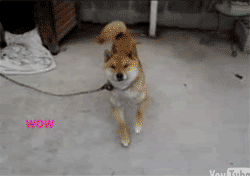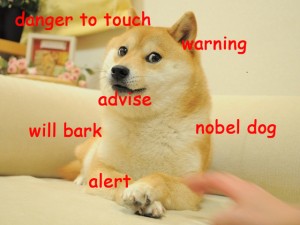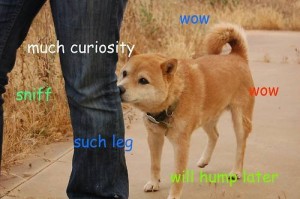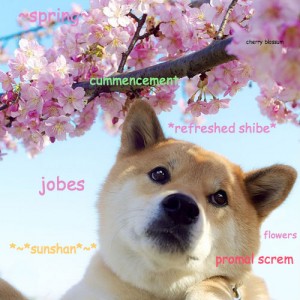If the doge meme is just a big pile of broken grammar rules, why did it look so off when a couple months ago a politician used it in an ad? How is it possible to get doge wrong? And is doge going to die someday (soon?), or could it become part of regular language?
-Conner
***
Dear Conner,
I would never have done this back when doge was just the happiest little corner of reddit, but since it’s become popular enough for politicians to be coopting it, I guess the secret is out and I may as well overanalyze.
Doge breaks some (though not all) of the standard English grammar rules. But it does so in particular ways and patterns, and thereby sets up its own new doge-grammar rules. You can see this by comparing lolcat-speak to doge: if they both just randomly broke rules, then you would be able to put lolcat phrases on doge images and vice versa, with no loss of humor. But you can’t – or, at least, if you had a lolcat with doge grammar, it’d fit better under the umbrella of dogeness than lolcatness. Lolcat grammar and doge grammar are different, and they both do have rules. Rules that the politician you mention, Representative Stockman, R-TX, has not learned.

This dude is not Rep Stockman, but Senator Cornyn, who Stockman evidently dislikes and therefore wanted to associate with a famous and beloved meme. Or something.
To understand the senator’s mistakes, we need to decide what the rules of doge are. The only way to do that is to look at a large sample of images and see what patterns people are consistently following. So I did the only logical thing and made a corpus of the speech used in the 100 most popular doge images on imgur.* Yeah, meme research is serious business here at the League.
The Grammar
There are 648** discrete non-“wow” items in the corpus. Of those, 247 are begun by “such,” “much,” “so,” “very,” or “many.” These five words start off more than a third of the data points for a reason: using one and following it with a word or phrase that would not follow in standard English is excellent doge style.
“Such” is the most common example, so let’s take a closer look at it. In standard English rules, “such” is followed by a noun. An uncountable or plural noun can come solo, while a singular noun must have the article “a.” Adjectives are often inserted, and doing so emphasizes them. So, for example, “such beauty” and “such flowers” are ok under the first option, and “such a beautiful flower” is fine by the second.
In the doge corpus, there are 95 examples of “such X,” and in 37 “X” is not a noun at all. They’re verbs, adjectives, or even sentences, as in “such cold,” “such scare,” and “such nope wil not moev.” 26 are singular nouns, none with the article “a,” as in “such hat” and “such opinion.” And 32 are uncountable or plural nouns, and thus accurate under standard English grammar rules as well – “such effort,” “such sadness,” “such gentlmen.” That’s a good amount of overlap, almost a third of the items. The other terms had a lower percentage of English-class-acceptable entries – of thirty terms starting with “very,” just one was followed by the prescribed adjective, “very culturel.”
These are very different from standard English, sure, but they’re not rule-free. You don’t follow “such” with a preposition or an article, for example – no “much the” or “so for.” (Well, not yet.) They’re not random.
The remaining 401 members of the corpus have more variety. The largest groups are complete sentences, with 115 terms, and nouns or noun phrases, with 165. A noun phrase is a group of words headed by a noun, that is, where the other words are attached to the noun. “Denim” and “seductun” are nouns, while “cool riples” and “shibe in motion” are noun phrases. (Just trust me on this, and we’ll do X-bar theory some other time.***) Many of the items are references to internet and popular culture, as in “1 giant step 4 dogekind” or “tupac alive.” They are usually from the perspective of the doge itself, though it sometimes looks as though an outside observer (another doge, presumably) is commenting on the situation.

Here, for example, “still go!” looks to me like something another doge would say in awe while watching. Even more for “u get milkbome.” And yes, I went through this and all other gifs frame-by-frame to get every word. When I build a corpus, I whole-ass it, y’all.
The main grammar change from standard English is deletion. This is very different from, to come back to my earlier example, lolcat. In “I can has cheezburger?” the word “has” is used instead of “have,” the standard English requirement to agree with “I.” It’s a different conjugation of the verb, a change. Doge mostly doesn’t do that, and instead just removes words, leaving you to fill them in. Many of the noun phrases and adjective phrases seem like predicates, with a deleted “I am” or “I have” or “There is.” “[I have a] new perspective,” “[there is] little air,” “why are [there] canals,” “[I am a] nobel dog,” and so on.
When I was going through this, I was surprised by how often the grammar does fit standard English rules, against my intuition. The main and most well-established grammar change is in the such/much/etc crowd, while here, though there are these texting-like deletions, the grammar is often complete even in lengthy sentences. See things like “how can ohter dougs compar,” “we r one wiht nateur,” and “i am raedy to lern.” Here, the rule-breakage is instead found in the spelling, which we will get to… next.
Stockman Score: 5/10
Representative Stockman misses a huge opportunity by not including any such/much/etc phrases, even though it is the most recognizable feature of doge. The four phrases he does use are all acceptable but unusual, and they’re all unusual in the same way. They are all verb phrases, and more specifically, they are all almost complete sentences, only missing the subject “I.” “[I] support Obamacare funding,” “[I] oppose Ted Cruz,” etc. This is not an impossible structure for doge to use – the famous “will hump later” is of this type – but out of the corpus of 648 items, these “I”-less verb phrases reach a grand total of 16, or a little less than 2.5%. He seems to be trying by not putting the past tense on “kill” in “kill GOP filibuster,” but that’s not really a common feature of doge, which usually does mark tense. It’s good that he included at least the one “wow,” though.
The Typography and Orthography
Typography refers to the shapes of letters and how the words are arranged on the page. For doge, the rules are simple. The font is comic sans, and usually each bit of text is written in its own bright color.*** The texts are arranged throughout the image, often in a vaguely circular form around a central doge picture. They are usually aligned horizontally, though they can be tilted, especially if that follows the shape of objects/doges in the picture. Occasionally you see doges done in the black-and-white block memefont, with text at the top and bottom of the image, but these are rare.
Orthography is the general word for the rules of writing a language, like spelling and punctuation. Here the doge rules get more interesting. The line to walk in doge spelling is making it notably different from that of standard English, but not so different that it’s impossible to see what words are intended. There are a few ways this is done:
—Internet or other spelling common outside of doge, as in “plz dont delete,” “evn mah shadow is sexy,” “im comin for ya,” “trim 2moro,” and “what r ur digits.”
—Using a different vowel or a different spelling for the same vowel sound, like in “such fashun,” “soperb athleet,” “winneng the rase,” “supar playar,” “very truble.”
—Deletion of letters, as in “to far?,” “”such legendry,” “#nofiltr,” “intricat details,” and “bak in my day shibe was jpg.”
—Spelling more phonetically, like “such innovashun,” “no fingerz lol,” “winneng the rase” again, and “2virchual.”
—My favorite, switching two letters that come in succession. This cracks me up because, while all of these are based more on writing than pronunciation, this most sharply brings to mind an image of a dog typing too fast and getting letters mixed. Here we have “nobel doge,” “chapmion,” “ears tukced,” “so touchigns,” and “ur place or mien.”
More rarely, we have insertion (adding a letter, as in “cllub cant handel!!”) and much more rarely a letter will be changed for another without a phonetic reason, as in “good dofe.”
The spelling is carefully balanced. Long phrases or sentences where the grammar makes clear what the words are will usually have the spelling changed. The same for long words that are distinctive in their own right, or short words that are obvious from the context of the picture (“super siwm”). But the majority of words are spelled just like standard English, and if changing the spelling would make it difficult to get the joke, the spelling stays. Words in the such/much/so/very/many paradigm are more likely to be spelled standardly. It’s a bit of a dance, but the many, many authors of these images get their points across well. Most images have spelling changes or grammar peculiarities, and many have both, but they are only an entertainment, not an encumbrance. Out of all 648 bits of text, there’s only one I haven’t been able to figure out: “promal screm.”
Stockman Score: 2/10
The typography is entirely correct in Rep Stockman’s picture. It’s the easiest aspect of the meme to see and understand, so that’s not too surprising, but kudos nonetheless. The orthography is another matter. These words are just perfect for a little messing with, especially “Obamacare,” I mean come on. And what do we get? Nothing. Weak.
The Content
Doges get around, and into a lot of strange situations apparently. But the heart of the meme lies in really selling it as being from the doge’s perspective. All the qualities that we anthropomorphize into dogs – earnestness, sweetness, a generally optimistic outlook, complete absorption in whatever is in front of it right now – are present in the doge.
Stockman Score: 0/10
Even with the slightly unusual doge grammar and the utter lack of doge spelling, Representative Stockman could’ve pulled it off if the attitude had been right – happy, sincere, goofy, a little fuzzy-headed. Unfortunately, with the arguable exception of “fuzzy-headed,” these words are not usually applied to politicians, and they are not present in this ad. Utter failure.
So coming around to your second question, is doge going to vanish into the mists of time? Could be. Fads and nonce words come and go, and many leave little trace in their wake. Certainly all of English is not going to become doge. But could aspects of doge grow in popularity enough that they became standard? Hmm. Doge doesn’t have a catchphase, except “wow,” which is already a standard interjection. The most distinctive feature of doge is its use of unusual words after “such” and “very” and so on. But for that to catch on, English speakers as a group would need to be willing to redefine their idea of what is acceptable after a word like “such.” Is there any evidence that we would be willing to do that?
Uh, yeah. Meme of the Year, meet Word of the Year.
Such possible. Because language. Good luck.
Yours,
The Language Nerd
*Why I went with imgur, how I decided what images to include, and other specifics are found on the corpus page.
**My numbers might not add up perfectly, because after a while I started drinking.
***Actually, a noun is just a noun phrase with nothing else in it. But again, X-bar theory later.
****This makes doge easier to analyze than many language data sets, because the color-coding tells you which words go together most of the time (there’s only one I wasn’t sure about, see the corpus for details).
If you enjoyed this, you may also like my analysis of Cookie Monster’s speech.
Got a language question? Ask the Language Nerd! asktheleagueofnerds@gmail.com
Twitter @AskTheLeague / facebook.com/asktheleagueofnerds
References forever!
Here’s the American Dialect Society, the only place that does a Word of the Year that actually matters. And here are two more articles on their most recent choice. And here’s a Geoffrey Pullum paper on what the parts of speech really are, which is awesome.
The Wired article that I got Rep Stockman’s picture from, and also an article about the level of crazy that both he personally and also the rest of Texas politicians carry.
And, of course, three cheers to the doge-makers, at imgur and everywhere else! HIP HIP HURRAH. Imgur makes it difficult to know who the original creator of something is, and who is just reposting, so if you or someone you know has made these images (especially those I used the pictures of here), please let me know so I can credit you.
P.S. – Happy Mardi Gras, hometown folks!! This is the worst thing about living abroad, the tragic lack of people throwing beads and moonpies at me.



